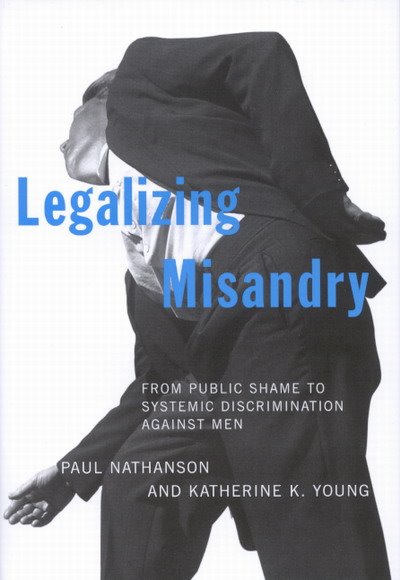Women are at least as violent as men but the evidence is being dismissed or ignored
Women are at least as violent as men but the evidence is being dismissed or
ignored
By Melanie Phillips
Mention feminism to most people and the reaction will probably be one of
faintly amused indifference. Some men may be irritated by feminist
rhetoric; some women might feel their agenda is a little extreme. But the
extent to which feminism in its most extreme form has embedded itself
within the institutions and thinking of Britain has simply not been grasped.
Feminism has become the unchallengeable orthodoxy in even the most
apparently conservative institutions, and drives forward the whole
programme of domestic social policy. Yet this orthodoxy is not based on
concepts of fairness or justice or social solidarity. It is based on
hostility towards men.
The idea that men oppress women, who therefore have every interest in
avoiding the marriage trap and must achieve independence from men at all
costs, may strike many as having little to do with everyday life. Yet it is
now the galvanic principle behind social, economic and legal policy-making.
Buried within this doctrine, though, is an even deeper assumption. Male
oppression of women is only made possible by the fact that men are
intrinsically predatory and violent, threatening both women and children
with rape or assault. Men are therefore the enemy - not just of women but
of humanity, the proper objects of fear and scorn.
This assumption runs through feminist thinking as a given. "Most violence,
most crime ... is not committed by human beings in general. It is committed
by men," wrote Jill Tweedie.
According to Marilyn French, men used violence both to threaten and
control, as well as actually harm: "As long as some men use physical force
to subjugate females, all men need not. The knowledge that some men do
suffices to threaten all women."
Moreover, it is marriage and family life that expose women most to male
violence. According to Gloria Steinem, "patriarchy requires violence or the
subliminal threat of violence in order to maintain itself... The most
dangerous situation for a woman is not an unknown man in the street, or
even the enemy in wartime, but a husband or lover in the isolation of their
own home".
All this has been enough to turn the stomachs of some feminists,
particularly those who love husbands or sons. Novelist Maggie Gee said she
once thought the sex war was exciting, but had now concluded it went too
far. "Women are giving up on their relationships too quickly. Living with a
man I love very much, I keep thinking that all the generalisations about
men just aren't true."
These generalisations, however, are now the stuff of public policy. Male
violence against women, said the government in June 1999, was no longer
going to be "swept under the carpet". Virtually nobody questioned the
premise that men were invariably victimisers and women always their victims.
There is no doubt that some men are violent towards women; the evidence of
women's injuries is real enough. However, this is one side of the story
only. There is another side: the extent of women's violence against men and
children. That, though, is a story that almost every official body in
Britain and America has successfully suppressed.
There are now dozens of studies which show that women are as violent
towards their partners, if not more so, than men. Unlike most feminist
research, these studies ask men as well as women whether they have ever
been on the receiving end of violence from their partners. They are
therefore not only more balanced than studies which only ask about violence
against women, but are more reliable indicators than official statistics
which can be distorted by factors affecting the reporting rate - women
using claims of violence as a weapon in custody cases, for example, or men
who are too ashamed or embarrassed to reveal they have been abused.
Many people are likely to be astonished and sceptical about the conclusion
drawn by these reports. The idea that women are as violent as men is
counter-intuitive and simply disbelieved. So it is important to provide a
flavour of the scope and significance of their findings.
A 1994 British study by Michelle Carrado and others, for example,
interviewed 1,800 men and women with heterosexual partners. Some 11% of the
men but only 5% of the women said their current partner had committed acts
of violence towards them, ranging from pushing, through hitting, to
stabbing. Five per cent of married or cohabiting men reported two or more
acts of violence against them in a current relationship, compared with only
1% of women. A further 10% of men but 11% of women said they had committed
one of these violent acts.
Study after study shows women are not merely violent in self-defence but
strike the first blow in about half of all disputes. The American social
scientists Murray Straus and Richard Gelles reported from two large
national surveys that husbands and wives had assaulted each other at
approximately equal rates, with women engaging in minor acts of violence
more frequently. Elsewhere, they found more wives than husbands were
severely violent towards their spouses.
Moreover, there is now considerable evidence that women initiate severe
violence more frequently than men. A survey of 1,037 young adults born
between 1972 and 1973 in Dunedin, New Zealand, found that 18.6% of young
women said they had perpetrated severe physical violence against their
partners, compared with 5.7% of young men. Three times more women than men
said they had kicked or bitten their partners, or hit them with their fists
or with an object.
In any event, the idea that women are never the instigators of violence is
demolished by the evidence about lesbians.
According to Claire Renzetti, violence in lesbian relationships occurs with
about the same frequency as in heterosexual relationships. Lesbian
batterers "display a terrifying ingenuity in their selection of abusive
tactics, frequently tailoring the abuse to the specific vulnerabilities of
their partners". Such abuse can be extremely violent, with women bitten,
kicked, punched, thrown down stairs, and assaulted with weapons including
guns, knives, whips and broken bottles.
It is true that most women who are the victims of violence suffer domestic
assaults. Yet the 1996 British Crime Survey reported that nearly one third
of the victims of domestic violence were men, and that nearly half of these
male victims were attacked by women. Moreover, if a woman starts a physical
fight with a man, even a mild slap might provoke him into retaliating, with
far worse consequences. Women who murder violent husbands may be treated
leniently because they were provoked; yet men who are violent against women
are never granted the same understanding. Provocation, it appears, is a
feminist issue.
Moreover, given the greater strength of men, it is particularly noteworthy
that so many women initiate violence against them. The fact is that men
hold back. The psychologist John Archer has noted that, among female
college students, 29% admitted initiating an assault on a male partner. Of
those women, half said they had no fear of retaliation or, since men could
easily defend themselves, they did not see their own physical aggression as
a problem. In other words, far from assuming that men are violent, women
take men's non-aggression for granted.
Archer went on to remark on the apparent restraint shown by many men in
western cultures. "We might speculate that to some extent a strong norm of
men not hitting women enables women to engage in physical aggression which
might otherwise not have occurred," he wrote. Male aggression, he
suggested, was a kind of default value associated with patriarchal structures.
When these are overridden, as they have been by modern secular liberal
values and by the emancipation of women, female aggression increases.
"These values will have greatest impact in a relationship that can be ended
by the woman at little cost, and where the rate of male aggression is low.
"We can speculate that these represent specific instances of a more general
set of circumstances entailing a relative change in the balance of power
between men and women."
In other words, as women have become independent of men, they have also
become more violent towards them - because men have become dispensable.
This unpalatable conclusion, however, has been completely overlooked in a
culture that believes infamy is the prerogative of the male.
Much to everyone's astonishment, the Home Office recently produced its own
evidence that domestic violence was not a male disease. In January 1999, it
reported that 4.2% of women and 4.2% of men aged 16 to 59 said they had
been physically assaulted by a current or former partner in the past year.
Women separated from their partners were most likely to be victims, with
22% assaulted at least once in 1995.
The public reaction to the Home Office research was almost complete
silence. The government, too, appeared impervious to its implications.
Shortly after it was published, the Home Secretary opened a domestic
violence court in Leeds that was founded on the explicit assumption that
only men were violent.
In June this year, the Cabinet Office women's unit launched a campaign to
"change the culture" that presented domestic violence as almost exclusively
a problem of male crime. It managed to omit another under-reported fact:
that most violence against children is committed by their mothers, not
their fathers. A study by the National Society for the Prevention of
Cruelty to Children revealed a few years ago that natural mothers, not
fathers, are most frequently the perpetrators of physical injury, emotional
abuse and neglect. This is not particularly surprising, since mothers
generally have much more daily contact than fathers with their children.
There was yet another notable omission: the women's unit material did not
differentiate between couples who were married and people who were living
together or had irregular lovers.
It therefore omitted a key fact: that the risk of violence increases
significantly for unmarried couples. The Home Office study itself observed
that marital separation was a "key risk factor". Only 12.6 in every 1,000
married women are victims of violence, compared with 43.9 in every 1,000
never-married women and 66.5 in every 1,000 divorced or separated women. As
husbands are replaced by partners and lovers, therefore, violence against
women increases. Marriage is a strong safety factor for women.
Yet this is not said. Instead, the opposite idea is fostered, that violence
against women typically takes place within marriage. In November 1998, the
women's unit announced a new initiative. Children were urged to report
violence against mothers and sisters. There was no mention of abuse against
fathers. Instead, a television advertisement showed a husband berating his
wife when she told him dinner would be late. That was the violence. It was
followed by a helpline number for children to call if a woman in their
house had been abused.
This fictional scenario illuminated some remarkable thinking by civil
servants and ministers. It had become acceptable, it thus appeared, for
children to inform on their fathers to teachers or "helplines" simply for
shouting at their mothers. Shouting was now to be classified as domestic
violence. If that is the case, then violence happens with enormous
frequency in families. Don't women sometimes shout at men?
There was another telling aspect of this advertisement. It featured an
"Oxo" middle-class nuclear family. The thinking behind this, according to
the then Scottish Office minister Helen Liddell, was that "domestic abuse
knows no boundaries of social class or social group". However, not only was
this scenario not violence, but the nuclear family is the least likely
setting for abuse of women or children. It was no accident, however, that
it was chosen. The married nuclear family has to be demonised because it is
said to be the vehicle for the oppression of women.
The outcome of all this is that it is now generally accepted that violence
is intrinsically male. This is a gravely distorted picture. It is true that
most recorded crime is committed by men. It does not follow, however, that
most men commit crime. Yet this is the false conclusion that has been
drawn, as the result of the suppression or distortion of the facts about
violence as well as the message that is constantly promulgated that
violence is a problem of masculinity. The evidence suggests that a quite
different conclusion should be drawn. This is surely that both women and
men are capable of aggression and violence, but that violent men, like
violent women, are not typical of their sex.
---
Extracted from The Sex Change Society: Feminised Britain and the Neutered
Male, by Melanie Phillips.
Man ordered to help ex-wife who spent her divorce cash
The Times (Britain)
28 June 2007
Man ordered to help ex-wife who spent her divorce cash
By Helen Nugent
A wealthy retired builder was ordered to pay more money to the woman he
divorced nearly 30 years ago after a judge heard she had "fallen on hard
times", the Court of Appeal heard yesterday.
Dennis North, 70, married his first wife Jean, 61, in 1964 and they
divorced in 1978, a year after he found out that she was having an affair.
In 1981 he made a financial settlement with her, buying her a house and
investments. Over the years, he increased her assets so that she would be
able to live comfortably for the rest of her life, the judges were told.
But in 1999, she sold up and moved to Australia, and her capital dwindled
because of bad investments and because of what the court heard was a
lifestyle beyond her means.
Mr North, who lives in Derbyshire, was left to bring up their three
children and went on to remarry and have two more children. Since divorcing
his first wife, he had prospered and is now estimated to be worth between
£5 million and £11 million, the court was told.
A district judge agreed in April that her money troubles had nothing to do
with her former husband and that he had no further responsibility towards
her, but awarded her £202,000.
Mr North wants the Court of Appeal to quash the award. Philip Moor, QC,
representing him, told the panel of judges headed by Lord Justice Thorpe
that Mrs North had made no attempt to find a job since 1977, when she was 32.
When she sold all her assets and emigrated, she chose to live in an
expensive part of Sydney, he said. She is believed now to be living near Leeds.
"The whole purpose of divorce is to disentangle people so they can lead
independent lives," he said. "The effect of the order is to give Mrs North
a second bite of the cherry."
Mr Moor said that the district judge had found that had Mrs North stayed in
England she would have been comfortably off for the rest of her life. He
added: "He then made a number of findings of fact as to the lifestyle
choice that had damaged Mrs North's financial position."
Mr Moor said that these included deciding not to work, to sell up and put
her money in bad investments, to live in Australia, where she had no
entitlement to state benefits, and to live in one of the most desirable
parts of Sydney.
He said that what the district judge had ordered was in reality for Mr
North "to make up the deficit" in Mrs North's reduced capital which had
been caused by her actions.
"The changes in financial positions of the parties since 1981 and the
differential between them that has arisen over the years cannot be relevant
given the findings of the district judge that Mr North should not bear
responsibility for Mrs North's position."
Deborah Bangay, QC, representing Mrs North, said that her former husband
had a continued responsibility for her client and that the district judge
had taken into account their differing situations. She said that it was not
Mrs North's fault that her investments had gone wrong. "She needed some
support and the district judge gave her a sum at the bottom end of the
spectrum," she said.
"This was not a second bite at the cherry but what are her reasonable
needs. The court was entitled to take into account the obvious wealth of
the former husband. It was an extraordinarily modest award set against his
wealth."
Lord Justice Thorpe, Lord Justice May and Mr Justice Bennett reserved their
ruling to a later date.
JUDGE THROWS OUT WOMAN'S HARASSMENT SUİT........YEAH....
"A Spanish judge has thrown out a woman's harassment suit against her ex-husband on the grounds she has a good education, arguing that had she really suffered abuse during their 16-year marriage she would have reported it right away or sought counseling.
"Women's advocacy groups voiced outrage over Wednesday's ruling by a judge in the northern city of Valladolid, and Spain's ruling Socialist party asked a judicial oversight board to review it.
"The plaintiff, a high school teacher whose name has not been released, filed the suit last month arguing that her husband subjected her to psychological harassment throughout their 16-year marriage. They separated three years ago.
"Judge Jose Luis Chamorro, who heads a court specializing in gender violence cases, cast doubt on the woman's claims.
"He said he found it 'surprising' that a woman with her level of education would put up with that alleged treatment for so many years without reporting it or seeing a psychiatrist, and 'curious' that she is filing suit now, years after the marriage fell apart.
"Rocio Mielgo, president of the Association of Victims of Sexual Aggression and Mistreatment, said the ruling is unacceptable because it suggests that only 'if you are from a lower class or have little education can you be mistreated.'
"The ruling Socialist party's top official on sexual equality issues, Maribel Montano, called the judge's arguments 'worrisome' and asked a body that acts as watchdog for the Spanish judicial system to review the sentence."
On a certain, reductionist level, of course feminist women's advocate Mielgo is absolutely correct--certainly it is untrue that only "if you are from a lower class or have little education can you be mistreated."
On a larger level, though, Judge Chamorro has a point. Chamorro has to try to navigate through the he said/she said to try to figure out the truth, in a case which is apparently without substantial witnesses and physical evidence. In doing so the factors he mentions--that an educated woman had supposedly put up with the alleged abuse for many years without reporting it or seeking any help, and is only filing suit years later--are perfectly legitimate factors to consider.
"A Spanish judge has thrown out a woman's harassment suit against her ex-husband on the grounds she has a good education, arguing that had she really suffered abuse during their 16-year marriage she would have reported it right away or sought counseling.
"Women's advocacy groups voiced outrage over Wednesday's ruling by a judge in the northern city of Valladolid, and Spain's ruling Socialist party asked a judicial oversight board to review it.
"The plaintiff, a high school teacher whose name has not been released, filed the suit last month arguing that her husband subjected her to psychological harassment throughout their 16-year marriage. They separated three years ago.
"Judge Jose Luis Chamorro, who heads a court specializing in gender violence cases, cast doubt on the woman's claims.
"He said he found it 'surprising' that a woman with her level of education would put up with that alleged treatment for so many years without reporting it or seeing a psychiatrist, and 'curious' that she is filing suit now, years after the marriage fell apart.
"Rocio Mielgo, president of the Association of Victims of Sexual Aggression and Mistreatment, said the ruling is unacceptable because it suggests that only 'if you are from a lower class or have little education can you be mistreated.'
"The ruling Socialist party's top official on sexual equality issues, Maribel Montano, called the judge's arguments 'worrisome' and asked a body that acts as watchdog for the Spanish judicial system to review the sentence."
On a certain, reductionist level, of course feminist women's advocate Mielgo is absolutely correct--certainly it is untrue that only "if you are from a lower class or have little education can you be mistreated."
On a larger level, though, Judge Chamorro has a point. Chamorro has to try to navigate through the he said/she said to try to figure out the truth, in a case which is apparently without substantial witnesses and physical evidence. In doing so the factors he mentions--that an educated woman had supposedly put up with the alleged abuse for many years without reporting it or seeking any help, and is only filing suit years later--are perfectly legitimate factors to consider.
"A Spanish judge has thrown out a woman's harassment suit against her ex-husband on the grounds she has a good education, arguing that had she really suffered abuse during their 16-year marriage she would have reported it right away or sought counseling.
"Women's advocacy groups voiced outrage over Wednesday's ruling by a judge in the northern city of Valladolid, and Spain's ruling Socialist party asked a judicial oversight board to review it.
"The plaintiff, a high school teacher whose name has not been released, filed the suit last month arguing that her husband subjected her to psychological harassment throughout their 16-year marriage. They separated three years ago.
"Judge Jose Luis Chamorro, who heads a court specializing in gender violence cases, cast doubt on the woman's claims.
"He said he found it 'surprising' that a woman with her level of education would put up with that alleged treatment for so many years without reporting it or seeing a psychiatrist, and 'curious' that she is filing suit now, years after the marriage fell apart.
"Rocio Mielgo, president of the Association of Victims of Sexual Aggression and Mistreatment, said the ruling is unacceptable because it suggests that only 'if you are from a lower class or have little education can you be mistreated.'
"The ruling Socialist party's top official on sexual equality issues, Maribel Montano, called the judge's arguments 'worrisome' and asked a body that acts as watchdog for the Spanish judicial system to review the sentence."
On a certain, reductionist level, of course feminist women's advocate Mielgo is absolutely correct--certainly it is untrue that only "if you are from a lower class or have little education can you be mistreated."
On a larger level, though, Judge Chamorro has a point. Chamorro has to try to navigate through the he said/she said to try to figure out the truth, in a case which is apparently without substantial witnesses and physical evidence. In doing so the factors he mentions--that an educated woman had supposedly put up with the alleged abuse for many years without reporting it or seeking any help, and is only filing suit years later--are perfectly legitimate factors to consider. AP.
Father denied justice by NZ courts, says UN
Father denied justice by NZ courts, says UN
Thursday April 19, 2007
The United Nations has slammed the New Zealand legal system for
denying justice to a man accused of abusing his children.
The Government now has three months to explain itself to the
international body and offer a solution to the man.
Human rights lawyer Tony Ellis took the man's case to the UN's
Human Rights Committee saying his client's right to a fair trial had
been ignored by the Family and then the Appeal Courts.
The man, who cannot be named due to the ongoing custody
dispute, was accused in 2001 by his estranged wife of abusing his
two daughters and then, later, abusing his son.
Police investigated for nearly two years, but decided not to
prosecute.
The father was denied access to his daughters and the Court of
Appeal refused leave to appeal the decision.
The man is still fighting for access to see his son in the Family
Court.
The committee found the lengthy proceedings violated the father's
rights to a quick and fair trial in respect of his daughters and son.
It regretted the Court of Appeal's "failure to understand and
embrace international human rights".
The very nature of custody proceedings concerning access of a
divorced parent to their children required that the issues
complained of should be dealt with speedily, the committee said.
"The onus is thus on the State and the courts, the police, child
welfare authorities and others, to be sufficiently well-resourced and
structured and establish their priorities in order to ensure
sufficiently prompt resolution of such proceedings and safeguard
the Covenant rights of the parties," it said.
The committee said that without a prompt hearing, the rights of
non-custodial parents were in effect already decided.
It added: "This is plainly unacceptable, and is a major failing as
there is no level playing field, and it is well known that justice
delayed is justice denied."
They said they would "await with interest" what remedy the
Government would be offering the father within a 90 day timeframe.
Courts Minister Rick Barker said today the committee had informed
the Government of its views.
The committee had found the majority of the complainant' s
allegations were inadmissible, or did not in fact constitute violations
of the complainant' s rights, he said.
It also found the original Family Court in 2003 had reached a "full
and balanced" evaluation of the family's situation and the children's
best interests based on testimony of the parties and expert advice.
However, it did express the view that the International Covenant on
Civil and Political Rights was breached because of the length of
time taken to conclude the proceedings.
Mr Barker noted the committee's views were "non-binding" but said
the Government would examine its findings and consider how to
address these.
The committee's views had been relayed to the relevant
government agencies and the principal Family Court judge and the
Government would respond to the committee within 90 days.
If chicks ruled the world, it would look much the same
THE WRY SIDE
If chicks ruled the world, it would look much the same
By Emma Tom
If one more person says the world would be a better place if it was ruled by women, I'll scream. Loudly, with lots of unladylike grimaces and flying spit.
Feminists are right to say chicks should fill about half the planet's leadership positions. But claiming this will result in a better, kinder, gentler globe is unmitigated crap, right up there with "I don't usually do this sort of thing on a first date" and (from Brazilian waxers) "it won't grow back for at least six weeks".
Contrary to popular mythology, women are not the fairer sex. The harsh truth is that they can be as devious, vindictive and violent as the next man.
One of history's most prolific killers was Erzsebet Bathory, a Hungarian countess who tortured and murdered hundreds of girls on her family estate in Transylvania in the 16th century.
Bathory's modus operandi was to slit her victims' throats and bathe in their warm blood, sometimes after setting their pubes on fire.
Very feminine.
No doubt she would have loved a cup of tea and a little chitchat with Katherine Knight from rural NSW. This former abattoir worker was jailed for life in 2001 after stabbing her de facto partner 37 times and then skinning him, boiling his head and baking pieces of his buttocks with vegies.
Very Country Women's Association.
New research shows women are taking a leading role in terrorist attacks and blowing themselves up more often in suicide bombings.
They're also stepping up their involvement in sex crimes, with a disturbing increase in the number of women teachers arrested for inappropriate relationships with kiddies.
(If you're one of those sniggerers who reckons no sexual attention from a woman is ever unwanted by a bloke, put yourself in the place of the teenage boy gang raped with a rolling pin in Sydney in 2005 and imagine how you'd feel about the two girls charged over the attack. My guess is that it wouldn't be hubba-hubba. )
She-devils are starting young, too. In October 2005, an Australian psychologist told a conference that alpha females were embracing their inner bitches and female bullying was rampant in the nation's schools.
In Bulgaria, several young women were injured in a bloody brawl between schoolgirls last October. These desperados used knuckledusters, chains and beer bottles to fight over the attentions of a spunky male peer.
Far more serious was the case of the two West Australian teenagers sentenced to life imprisonment earlier this month for garrotting a 15-year-old friend. The pair slaughtered two kittens as practice and said they killed Eliza Jane Davis because it just felt right.
She-thugs are starting young, but age certainly isn't slowing them down. In LA in mid-2005, two women in their 70s were arrested after allegedly befriending homeless men, taking out multiple life insurance policies and filing claims worth more than $US2.2 million when the transients died in mysterious hit-and-run accidents.
It's hard to say whether nannas are becoming nastier or whether their nastiness is just getting more press.
What's definite, however, is that continuing to claim that women occupy some higher moral ground is both outlandishly incorrect and extraordinarily unhelpful to the feminist cause.
First, it gives chicks a false sense of superiority. Second, it means their exclusion from positions of power can be justified on the grounds that firm, male hands are required for the world's steering wheels: hands attached to leaders who don't blubber over lost kittens and get all thingy about their bum sizes during nuclear showdowns.
Like men, women come in a range of colours, flavours and calibres. Some are paragons of states folkship, while others think its big and clever to pummel each other with nunchakus on the off-chance they score a date with the school heart-throb.
If women ruled the world, it would not be a better place. Odds are it would look a whole lot like it does now, minus the irrational sexism that falsely elevates chicks morally while unfairly thwarting them logistically.
Ironically enough, the key to women achieving more power may be owning up to the large numbers of the sistren who don't deserve it.
http://www.theaustralian.news.com.au/story/ 0,20867,21777884 -12274,00.html
The Australian
23 May 2007
Wife indicted after husband shoots and kills her lover in Texas....YEAH!!!
ARLINGTON, Texas (AP) -- Darrell Roberson came home from a card game late one night to find his wife rolling around with another man in a pickup truck in the driveway. Caught in the act with her lover, Tracy Denise Roberson -- thinking quickly, if not clearly -- cried rape, authorities say. Her husband pulled a gun and killed the other man with a shot to the head.
On Thursday, a grand jury handed up a manslaughter indictment -- against the wife, not the husband.
In a case likely to reinforce the state's reputation for don't-mess-with-Texas justice, the grand jury declined to charge the husband with murder, the charge on which he was arrested by police...
Tracy Roberson, 35, could get two to 20 years in prison in the slaying of Devin LaSalle, a 32-year-old UPS employee.
Assistant District Attorney Sean Colston declined to comment on specifics of the case or the grand jury proceedings but said Texas law allows a defendant to claim justification if he has "a reasonable belief that his actions are necessary, even though what they believe at the time turns out not to be true."
Mark Osler, a Baylor University law school professor and a former federal prosecutor, said the grand jurors evidently put themselves in the husband's place: "I can see one of them saying, `I would have shot the guy, too. I was just protecting my wife."'
The December night before the shooting, Tracy Roberson sent LaSalle a text message that read in part, "Hi friend, come see me please! I need to feel your warm embrace!" according to court papers. LaSalle apparently agreed.
Darrell Roberson, a 38-year-old employee of a real estate firm, discovered the two, his wife clad in a robe and underwear.
When Tracy Roberson cried that she was being raped, LaSalle tried to drive away and her husband drew the gun he happened to be carrying and fired several shots at the truck, authorities said...




















































No comments:
Post a Comment